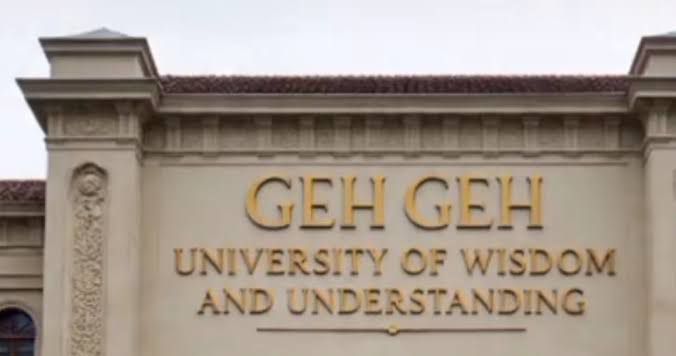The “Geh Geh University” Buzz: Clout-Chasing or A Shift?

INTRODUCTION
Nigeria’s internet space rarely goes a week without birthing a new buzzword, trend, or cultural sensation. The latest entry? “Geh Geh University.” The latest sensational flashpoint, erupting from the fringe of comedy to dominate discussions everywhere. Conceived by content creator and self-styled “financial expert” Emmanuel Obruste, popularly known as GehGeh, this online “University of Wisdom and Understanding” went from being a meme to a viral sensation almost overnight.

Photo Credit: Google Image
At the center of this wave is GehGeh, the online comedian and content creator whose style blends exaggerated humor with everyday Nigerian realities. Known for his slang-heavy punchlines and heavy takes, GehGeh has carved out a space where comedy meets social commentary, even if unintentionally. GehGeh, who bills himself as Nigeria’s “first illiterate founder of a university,” launched live sessions on TikTok under this guise. In what became a moment of unprecedented traction, the live session drew over 177,000 viewers, and gifts worth $30,000 were bestowed upon him by fans who tuned in, symbolically “enrolling” in his University of Wisdom.
But the speed at which “Geh Geh University” moved from harmless skit talk to a mainstream talking point raises deeper questions. Is this simply another case of internet clout-chasing, or does it reveal something more significant about Nigerian society, its youth, and the evolving nature of cultural adaptation in the Nigerian society? After the initial laugh fades, a sharper question begins to emerge: Is this mere internet stardom, another comedy trend chasing clicks and monetary benefits or is it a mirror reflecting deeper societal tensions and morals, masculinity and aspiration in contemporary Nigeria?
The Making of a Trend
What started as a seemingly harmless set of skits has quickly morphed into one of Nigeria’s most talked-about internet sensations, Geh Geh University. We've seen the take of Emmanuel Obrutse, popularly Known as GehGeh whose raw, unfiltered takes on relationships have drawn both applause and outrage. His “university” isn’t a real institution but a metaphorical space where he dishes out lessons blunt, often controversial that many young Nigerians find either painfully accurate or dangerously misleading.

Photo Credit: google Image
This buzz began with his short clips and “lectures” on social media, where he spoke in a mix of everyday pidgin and sharp humor. From advising men on how not to waste their time with unserious women, telling men to “wake up” in relationships, Geh Geh carved a niche for himself. His takes struck a nerve because they touched on the complexities of love, trust, and money in modern Nigerian relationships. Depending on who you ask, his advice could either strengthen a shaky union or completely wreck it.
But beyond the content, the timing and delivery mattered. The rise of Geh Geh University coincided with Nigeria’s growing TikTok boom and the youth-driven culture of bite-sized, viral content. Platforms like TikTok, X (formerly Twitter), and Instagram have become the loudspeakers that turned his “lectures” into nationwide conversations.
For some, Geh Geh University is just clout-chasing dressed as advice and comedy on relationship matters. For others, it’s an unintentional social commentary on the frustrations of young Nigerians navigating love and survival in a tough economy. Either way, the trend shows how quickly humor, relatability, and social media virality can merge to create a cultural wave.
Social Insight
Navigate the Rhythms of African Communities
Bold Conversations. Real Impact. True Narratives.
Public Perception: Fun or Foolishness?
Like every viral moment in Nigeria, Geh Geh University has split opinions right down the middle. For some, it is nothing more than harmless entertainment, a chance to banter and share opinions in the endless scroll of social media. This camp argues that Nigerians, who are constantly weighed down by economic pressures and political drama, needs something like this to gain “Wisdom and Understanding”
On the other side of the divide are critics who dismiss the entire trend as senseless clout-chasing. They argue that calling it a “university” mocks the real value of mentorship and giving guidance, especially in a country where thousands of of individuals learns any habit they come acros. For these voices, Geh Geh University isn’t creative expression, it’s a caricature that risks normalizing unseriousness in a society already struggling with declining standards.
The debate is not new. Nigeria has seen similar viral phenomena before, Each time, the country has been divided between those who enjoy the laugh and those who worry about what it says about the nation’s cultural priorities.
So, is Geh Geh University lowering the value of education, or is it simply another reminder that Nigerians will always find a way to turn everyday struggles into viral content? The answer may depend on whether you see social media trends as reflections of deeper issues, or just as fleeting digital fun that disappears as quickly as it arrived.
The Cultural Angle
At its core, Geh Geh University is more than a meme, it’s a mirror. It reflects how Nigerian youths constantly seek outlets to express themselves in a society where traditional structures of education, opportunity, and leadership often feel out of reach. In a country where anything can be used for clout chasing, it’s not surprising that a parody “university” online gains more traction than real matters that should be discussed regarding growth and development. Social media becomes the campus, hashtags the lectures, and skits the textbooks.
But while this speaks to the raw creativity of Nigerian youth, it also raises the question: what are we doing with all this energy? Imagine if the same energy, humor, wit, and relatability poured into Geh Geh University were harnessed for conversations around innovation, technological advancement, entrepreneurship, or political accountability, instead clout-chasing often takes center stage, with trends revolving around relationships, gender wars, or exaggerated banter, issues that, while entertaining, sometimes overshadow the more pressing conversations in the global economy.
Still, one cannot ignore that this intersection of culture, comedy, and social commentary has always been Nigeria’s strong suit. We've seen the likes of Mr. Macaroni and Broda Shaggi who have always used skits for Nigerians as a coping mechanism.
Geh Geh University proves one thing beyond doubt: Nigerian youth will always find creative ways to speak—whether it is for a good cause or not. The real question here is whether we choose to let that voice be reduced to clout and fleeting entertainment, or amplify it as a force for transformation in a country that desperately needs it.
The Impact Beyond Social Media
Like most viral Nigerian trends, Geh Geh University didn’t stay confined to the timelines. Brands, influencers, and even mainstream media have been quick to latch onto the hype, whether through playful adverts, branded skits, or cheeky hashtags aimed at tapping into the moment. It’s the same playbook we’ve seen with past viral phrases: turn cultural buzz into marketing gold before the trend burns out.

Photo Credit: NewsGhana
Social Insight
Navigate the Rhythms of African Communities
Bold Conversations. Real Impact. True Narratives.
But this also comes with a risk: the trivialization of serious issues, misplaced priorities, selling the wrong idealogies to the younger generation and a rise in possible moral decadence. When this parody university of Geh Geh take center stage, there’s a danger that they normalize the decline of systems and perspectives.
Yet, with this, there are also potential. Humor has always had a way of sneaking difficult truths into public consciousness. If packaged with intentionality, trends like this can become conversation starters: Why do Nigerians resonate more with an online parody than with their actual conversations? What does this say about access to quality education and what people learn in the society? And can brands, creators, or cultural commentators use the laughter to pivot toward advocacy, sparking campaigns that highlight the urgency of educational reform?
In the end, Geh Geh University is proof that comedy doesn’t just entertain; it shapes narratives. Whether we let those narratives fade into clout-driven noise or evolve into meaningful discussions, is a choice that lies with the audiences, the influencers who amplify it, and the society consuming it.
Conclusion
As with most viral sensations, Geh Geh University has split public opinion. Some netizens dismiss it as nothing more than empty clout chasing, while others applaud the creativity and humor behind it. But beneath the banter lies a deeper question: what are we really doing with our collective energy? In a country where the struggles for relevance is on the rise and the youth scramble for alternative paths, perhaps trends like these reflect more than just jokes, they expose frustration, ingenuity, lack of proper awareness and the craving for a platform.
Still, the risk remains that if the “good” energy of Nigeria’s youth continues to be poured solely into fleeting trends, the vacuum will be filled by those who thrive on triviality and distraction. In other words, when we choose not to steer the narrative, we leave the stage open for the “bad” actors to rise.
So, is Geh Geh University just empty clout or is it a loud commentary on how Nigerians are coping with a failing system?
Recommended Articles
Nigeria Takes On Crypto Giant: Binance Faces Tax Evasion Charges

Nigeria's Federal Inland Revenue Service has filed extensive tax evasion charges against cryptocurrency giant Binance an...
Crypto World Buzzes: Yellow Card Enlists Psycho YP as Brand Face

Yellow Card Financial, Africa's rapidly growing crypto exchange, has partnered with Nigerian artist Psycho YP as its new...
Nigeria's Digital Leap: Powering Up Internet Access with Ambitious New Inclusion Drive!

Nigeria is launching an integrated strategy to bridge its digital divide by linking electricity access and internet conn...
FG Targets Telecom Giant: MTN's $6.2BN IHS Towers Acquisition Under Fierce Regulatory Scrutiny

MTN Group has reached an agreement to acquire IHS Towers for an enterprise value of approximately $6.2 billion, regainin...
History Made! Eniola Bolaji Becomes First African World No. 1 in Para-Badminton

Nigeria's Eniola Bolaji has made history by becoming the first African athlete to achieve World No. 1 in women's SL3 par...
MTN's $6.2 Billion IHS Towers Acquisition: A Regulatory Battle Unfolds!

The Nigerian Federal Government will rigorously assess MTN Group's $6.2 billion acquisition of IHS Towers, citing concer...
You may also like...
Bundesliga's New Nigerian Star Shines: Ogundu's Explosive Augsburg Debut!

Nigerian players experienced a weekend of mixed results in the German Bundesliga's 23rd match day. Uchenna Ogundu enjoye...
Capello Unleashes Juventus' Secret Weapon Against Osimhen in UCL Showdown!

Juventus faces an uphill battle against Galatasaray in the UEFA Champions League Round of 16 second leg, needing to over...
Berlinale Shocker: 'Yellow Letters' Takes Golden Bear, 'AnyMart' Director Debuts!

The Berlin Film Festival honored
Shocking Trend: Sudan's 'Lion Cubs' – Child Soldiers Going Viral on TikTok

A joint investigation reveals that child soldiers, dubbed 'lion cubs,' have become viral sensations on TikTok and other ...
Gregory Maqoma's 'Genesis': A Powerful Artistic Call for Healing in South Africa

Gregory Maqoma's new dance-opera, "Genesis: The Beginning and End of Time," has premiered in Cape Town, offering a capti...
Massive Rivian 2026.03 Update Boosts R1 Performance and Utility!

Rivian's latest software update, 2026.03, brings substantial enhancements to its R1S SUV and R1T pickup, broadening perf...
Bitcoin's Dire 29% Drop: VanEck Signals Seller Exhaustion Amid Market Carnage!

Bitcoin has suffered a sharp 29% price drop, but a VanEck report suggests seller exhaustion and a potential market botto...
Crypto Titans Shake-Up: Ripple & Deutsche Bank Partner, XRP Dips, CZ's UAE Bitcoin Mining Role Revealed!

Deutsche Bank is set to adopt Ripple's technology for faster, cheaper cross-border payments, marking a significant insti...
